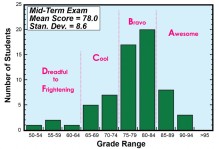W&M Freshman Seminars: Private Education at a Public University
Having just completed another freshman seminar I am reminded of what a rewarding experience it is for student and professor. Although, I suspect that most students don’t quite recognize it as the “luxury” it is-at least while they are in the midst of the experience. What’s so special about these seminars? Several things come to mind. First, small enrollment (mine had 16 students but most are capped at 15); this allows for significant interaction between students and between students and professor. Second, the structure allows for students to pick a seminar that involves an in-depth exploration of a topic that is of interest to them (mine was on “Identity and Society”). Third, our seminars are typically taught by full-time professors-and, in a number of cases by full professors. Fourth, students are required to re-write a high percentage of their assignments and they are given significant (and constructive) feed-back from their professors on their drafts. In my seminar, for instance, students wrote three drafts of their research paper and they also had the option (which most took) to revise their mid-term essay. Suffice it to say, this approach entails a major time commitment on the part of both student and professor but, in the end, all agree that revising papers and essays produces a noticeably more polished product. Interestingly, very few of my students claim to have prior experience with revising and rewriting papers before coming to college.
So, that’s the mechanics of the freshman seminar. What’s the in-class experience like? First, let me give some thoughts on the student experience in my class. Student comments and evaluations suggest that the vast majority of them find the seminar experience to be very rewarding-even exciting. It helps when the material they read and discuss has relevance for their own lives. Thus, when we read and discussed how our identities are shaped by multiple forces (race, social class, gender, nationality etc)-many beyond individual control-students begin to see their own identities in a very different light. Because class participation is mandatory, students quickly learn that they must do the reading and that they must come prepared to discuss what they have read. Putting two students in charge of leading discussion for each class quickly teaches them to engage with the material. Over the years, I have learned not only a greater patience with students in these regards but also various techniques for creating an atmosphere where students feel that they can talk without fear of being considered stupid or inadequate. I try to model what I call “thinking out loud” for them. This involves showing them how to present a thought generated by readings or comments of others and then analyzing what it means or why it matters (or doesn’t). Some love to talk, others are shy and hesitant. My job is to encourage and cajole each one of them to talk. At the same time, I face several challenges as a teacher. First, while encouraging them to talk, I have to also (delicately) find ways to remind them that talking for talking sake doesn’t cut it. Sometimes it works to ask the class to reflect on a particular comment and explain why it is relevant to the topic under discussion; how does the comment help us better understand an idea. Often, peers find ways to tell those who make irrelevant comments that their comments are ill-conceived and this form of feedback is particularly effective. A second challenge is to teach analytical thinking. Not an easy task. Students at this stage of their academic development are prone to make observations without much analytical connection. As a result, I spend a lot of time asking them to talk about why a particular observation is relevant. What, for instance, does it teach us about how various social forces impact identity construction if one observes that female students generally care more about how they dress than male students? A third challenge is to teach students how to be effective public speakers. Throughout the semester I emphasize the need to speak in more formal prose than if one were talking with a friend. Also, I try to discourage use of filler words such as “like”. With this in mind-and after we have few classes under our belts, I introduce a system whereby they are “fined” 5 cents each time that they use such words inappropriately (2 students are assigned to keep the tally). It becomes a game of fun and frustration (and a certain amount of gleeful “got you”) but, ultimately, it teaches them to think before they talk and to be more reflective of their language usage. In their formal presentations on their research topics I provide them, in advance, with the rubric I use to assess their presentations-and it includes many different factors from how convincingly they present their arguments to whether or not they use appropriate language and documentation and use them effectively. I also have peers evaluate each others’ presentations using a set of established criteria-this is an especially valuable exercise because students learn how their peers perceive them when they talk. I encourage constructive comments to each other (without names) and, apart from typical words of encouragement and praise, they also give each other a host of useful tips about what not to do when giving a presentation such as: not to fidget, not to look only at one person in the room (usually the professor), not to talk too fast, not to read from note cards too much. In addition, the astute critics tell their peers that their arguments are weakly documented or that they assume too much knowledge on the part of the listener.
Finally, let me comment briefly on the written components of the seminar because it is here that the W and M freshman seminar especially provides our students with what I earlier referred to as a luxury typically associated with small, private universities. It requires a significant commitment of faculty resources to provide each of our entering students with this intense attention. To have professors provide freshmen detailed comment on multiple drafts of papers on an individual basis is rare in the extreme in today’s public universities. It is also, beyond doubt, a highly successful way to teach students how to think and write effectively. For many students the experience is a novelty. Yet, all agree that, in the end, the hard work of revision and rewriting pays off. At the end of the semester when I discuss overall performance with each student, it is typical to see students beam with pride as we look back over their drafts and they recognize the transformation they wrought on their papers. That such experiences are confidence builders for young people at the beginning of their college experience is beyond doubt. Therein lies at least one of the major rewards of teaching freshman seminars at William and Mary. For my students there is an extra reward: they get to have dinner at my home and they get to see that I am a pretty normal human being who is also a pretty decent cook!




No comments.
Comments are currently closed. Comments are closed on all posts older than one year, and for those in our archive.